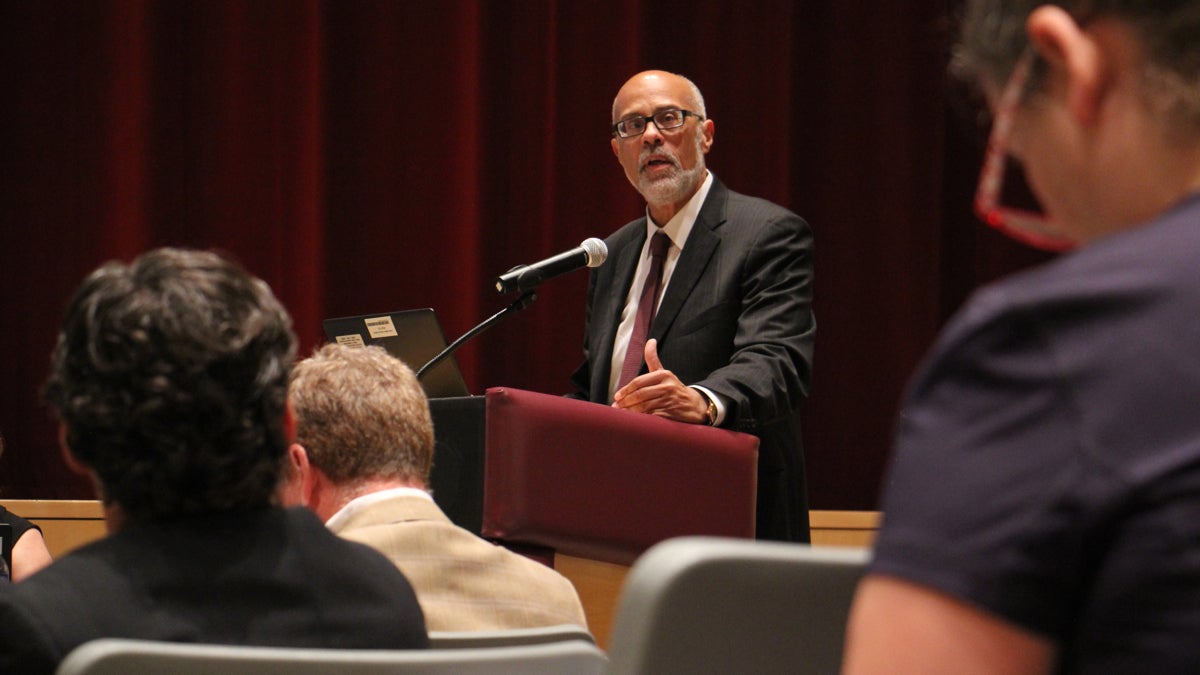Lower Merion School Board gets an earful, but resists judge’s order to roll back tax hike

Lower Merion schools Superintendent Robert Copeland defends the district's budgeting practices during a 2016 school board meeting after a judge ruled that the district misled taxpayers. (Emma Lee/WHYY)
More than 100 residents came out to a school board meeting in Lower Merion last night, the first following a judge’s order to roll back a recent property tax increase in the wealthy Montgomery County school district.
After becoming suspicious of annual tax hikes, three Lower Merion residents, Arthur Wolk, Philip Browndeis and Catherine Marchand, filed a suit, alleging the district deceived taxpayers and the Pennsylvania Department of Education (DOE) in order to get around limits imposed on annual property tax increases. In August, Judge Joseph Smyth agreed and granted an injunction, ordering the latest tax hike be rescinded.
From the outset, Board members and officials defended their practices as both legal and necessary.
“The district employs sound, good accounting practices. There is no doubt about that,” said superintendent Robert Copeland, who also highlighted the school’s commitment to going beyond minimum standards for education by providing an array of gifted classes and special accommodations for students.
In a joint presentation with school district business manager Victor Orlando, Copeland explained that ratcheting costs for special education, pensions and increased enrollment made the district’s budget unpredictable.
“You need a good fund balance if you want to have the ability to borrow money,” said Copeland. “You need money if you are going to be able to weather the storm of a [state] budget impasse for what what was it, nine months?”
In the past 11 years, annual increases have raised property taxes 53.3 percent in order to amass a fund balance totalling $50 to $60 million, according to court filings.
Pennsylvania’s Taxpayer Relief Act, or Act 1, caps the amount districts can raise taxes in a given year at 2.4 percent. If school officials think they need to exceed that amount, they must get approval from residents through a referendum, or from the DOE. Act 1 exceptions are common in Pennsylvania. An analysis by the Associated Press found more than two-thirds of Pennsylvania’s 500 districts received permission to exceed their tax cap in the last decade.
In Lower Merion, the state signed off on the increases.
Smyth found that the board had justified tax hikes by wrongly claiming the district was running a deficit — and subsequently ending the year with a surplus. Lower Merion also shifted money out of a unassigned surplus accounts into accounts for things like capital projects to keep the fund balance down.
At the meeting, residents expressed outrage from all sides.
Jane Broderson of Narberth thanked the school board, calling a good education “the greatest gift you could give our children.”
Lower Merion High School ranks fifth in the state, according to U.S. News & World Report, and the district as a whole is high-performing.
“This country is plagued by a notion that taxes are bad. People have forgotten what taxes are for,” she said.
Plaintiff Arthur Wolk also addressed the board, reiterating some of demands in the legal complaint.
“If you guys are so bad with numbers that you made a mistake, then give us back our money,” he said.
Transparency was a recurring theme, as was whether ends — a high quality education — justify the means — amassing a large surplus while also ratcheting up taxes.
“You need to budget for what you need, and if you come to years where you need more, you need to come to us and explain it. And we’ll approve it,” said Bill Manginelli of Narberth, referring to the process by voters can vote on large tax increases via a referendum. Other speakers also expressed their willingness to pay more if it were put to a vote.
Responses to the judge’s decision poured in from outside the district as well.
Pennsylvania Association of School Business Officers released a statement in support of LMSD’s budgeting practices and calling Smyth’s decision “erroneous” and creating “potentially negative implications not only for Lower Merion School District but for all school districts.” The association also released a list of “myths” about school budgeting, which refuting the interpretation that Lower Merion broke the law.
The school board has filed an appeal and received a stay, keeping the 4.4 percent increase for the 2016-2017 school year, pending a higher court’s decision. The school board voted to set aside money from the fund balance in the amount equal to the difference between actual taxes levied and the amount allowed without being granted an exception under Act 1.
WHYY is your source for fact-based, in-depth journalism and information. As a nonprofit organization, we rely on financial support from readers like you. Please give today.

